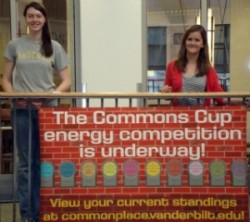
For many college students who are not faced with electric bills, energy conservation is not considered a priority. Two Metro Nashville high school students are attempting to change that attitude by implementing an energy conservation competition at Vanderbilt University.
Through an energy competition among freshmen students in residence halls at Vanderbilt, high school juniors Emily Alsentzer and Catherine Caffey hope to promote environmentally friendly behavior that will last throughout the students’ time in college.
[rquote]“We’re hoping that if the students develop good energy conservation habits as freshmen, they will continue them throughout their lives at Vanderbilt and beyond[/rquote],” said Alsentzer. “It would be interesting to see how many students retain such habits as upperclassmen when they are not being incentivized to conserve energy.”
The energy competition, which rewards students for using the fewest kilowatt-hours (kWh), is designed to test the effectiveness of nonmonetary rewards in influencing environmental behavior. Students in the halls with the greatest percent reduction of kWh as compared to the previous year’s usage will receive bragging rights for the year.
To administer this project, Alsentzer and Caffey sought the help of Andrea George, director of the Vanderbilt Sustainability and Environmental Management Office, and Students Promoting Environmental Awareness and Responsibility (SPEAR), a student organization at Vanderbilt. Ben Kahn, SPEAR’s vice president of energy and resource conservation, is serving as Alsentzer and Caffey’s supervisor throughout the competition. Kahn has worked with Alsentzer and Caffey to get approval of the project and has aided in its implementation.
Alsentzer, a student at Hume-Fogg Academic Magnet High School, and Caffey, a student at Martin Luther King Academic Magnet High School, are both enrolled at the School for Science and Math at Vanderbilt, a program offered to Metro Nashville Public School students that centers on an interdisciplinary science curriculum. One day a week for all four years of high school, Alsentzer and Caffey attend SSMV. According to Alsentzer, the SSMV curriculum stresses a critical approach to identifying and solving problems, skills they used to initiate the energy conservation competition.
The energy competition constitutes 20 percent of the larger Commons Cup competition, in which freshmen compete in categories such as intramurals, academics and community service. To promote the energy competition, Alsentzer and Caffey hung a banner in The Commons Center and sent emails out to all freshmen. Every month, the standings are updated both online and on posters placed in each residence hall so that the students can monitor their progress.
According to Caffey, the competition so far looks to be a success. Houses have averaged a 3.5 percent reduction in kWh usage and have thus far saved Vanderbilt approximately $10,000.
“We are delighted how much response we have gotten to the competition,” said Caffey. “Next year’s freshmen will have to be creative to be able to further reduce energy consumption from this year’s usage.”
Alsentzer and Caffey plan to enter their work in implementing the energy competition to the Siemens “We Can Change the World Competition,” a national competition which “challenges students to create sustainable, reproducible, energy-related environmental improvements that can be replicated throughout the globe.” They hope that the energy conservation competition will continue promoting environmentally friendly behaviors at Vanderbilt for years to come.
The School for Science and Math at Vanderbilt is supported in part by a National Institutes of Health NCRR Science Education Partnership Award, by Vanderbilt University Medical Center, and by the Nashville Alliance for Public Education.